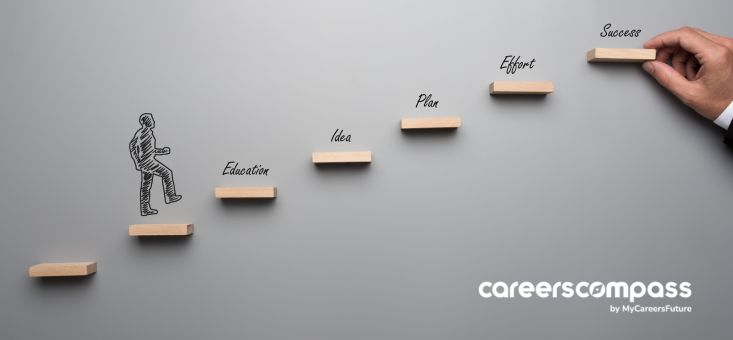In today’s dynamic work environment, career planning is necessary for all professions. It empowers you to adapt to a rapidly changing job landscape and find fulfilment in your work.
This journey starts even before you step into the workforce. In essence, a career plan is akin to a compass that can steer you towards success.
Career planning for younger workers
In my 15 years as a career coach, I have spoken with many fresh graduates. Some felt overwhelmed by the job search process and did not know how to start planning for their career, while others had not yet given thought to such planning.
Graduating from college or university is a significant milestone and the beginning of your professional journey. Career planning can help you transition from the academic world to the practicalities of the job market, ensuring a smoother entry.
I recently met a client in her 20s who, upon graduating with a marketing degree, hastily accepted a job as an advertising executive with a mid-sized advertising agency as her friends had already found full-time jobs, and she did not want to lose this opportunity. Over time, the relentless hours and high-pressure environment took a toll on her well-being.
I worked with her to explore alternative career paths that were more aligned with her passion for helping people. She eventually found a role with a non-profit organisation, which allowed her to put her digital marketing skills to good use in promoting the organisation’s outreach activities.
Looking back, she realised that a lack of proper career planning had been a barrier to her progress, and she was glad that she had decided to take a more active and structured approach to planning for her next move.
Career planning for mid-career workers
As you progress in your professional journey, it is normal for personal values and life goals to change. Current career trajectories may no longer align with your passions, but you might feel too entrenched to make a career switch.
A mid-career shift can be daunting, but it can enable you to finetune your professional goals for better alignment with your passions and values, leading to improved job satisfaction. During this pivotal period, effective career planning provides you with a structured and strategic approach to reinventing yourself and navigating the complexities of changing tracks.
Another client in his mid-30s worked as a corporate financial analyst for over a decade but found himself increasingly drawn to the world of sustainable energy and environmental conservation.
Recognising the challenges of transitioning to an entirely different field, he developed a career plan with my support, beginning with researching his chosen industry and attending conferences to gain further insights. He also enrolled in online courses to learn relevant skills.
His proactive approach didn’t end there. He volunteered for local environmental organisations to gain practical experience and sought out mentors who had successfully switched careers. Based on their advice, we worked together to revamp his resume and online profile to showcase his transferable skills and passion for the industry.
Several months later, he landed a role with a renewable energy start-up. Although the transition was challenging, his dedication to meticulous planning, skills development, and networking paid off. Over time, his determination and adaptability led to promotions and increased responsibilities within the company, which in turn led to greater job satisfaction.
Frameworks for effective career planning
Firstly, understand your Values, Interests, Personality, and Skills (VIPS).
These elements are pivotal as they guide you towards identifying suitable opportunities that resonate with your aspirations.
- Values define what you stand for and what you seek in your work. Identifying your values helps you align your career choices with what truly matters to you.
- Interests are the fire that fuels your career engine. What excites you? What are your passions? Your interests provide the fuel for your career journey, driving you towards roles and industries that ignite your enthusiasm.
- Your personality is your compass. Are you an introvert or an extrovert? Do you thrive in structured environments or flourish in creative chaos? Knowing your personality traits can help you identify your strengths and weaknesses.
- Skills are the tools in your career toolbox. Knowing your transferable skills and how they are valuable for the role that you’re looking for could give you the edge over other candidates.
Once you have identified your VIPS, develop an effective career plan by:
- Setting goals: Define your short-term and long-term career aspirations based on your latest VIPS. This provides a clear sense of direction and gives you something to work towards, making it easier to stay focused and committed.
- Exploring options: Research various industries and professions, both within and beyond your current company, for informed decision-making. This allows you to glean insights into the latest job market trends and identify where your skills and qualifications can be most effectively applied.
- Developing your skills and knowledge: Identify skills required for your chosen path and work on acquiring them through formal education, online courses, certifications, or on-the-job learning. Continuous skills development keeps you competitive in the job market and ensures that you stay relevant and valuable to prospective employers.
- Creating an action plan: Develop a detailed plan with manageable tasks, deadlines, and networking steps. This ensures that you remain on track, knowing what needs to be done.
- Adapting and being flexible: Be prepared to adjust your strategy when things don’t go as planned. This allows you to navigate unexpected challenges and setbacks without losing sight of your long-term goals. Staying flexible also allows you to pivot when new opportunities or trends arise.
Technology and tools for career planning can help
In today’s digital age, technology plays a vital role in career planning, with complimentary resources and tools that are available just a click away. Approach technology with a blend of curiosity and critical thinking — these tools are not definitive answers but rather starting points for reflection.
For example, the CareersFinder feature on Workforce Singapore’s MyCareersFuture portal can suggest suitable job matches and upskilling recommendations based on individuals’ profiles while considering their career aspirations.
We provide a one-stop destination for career-related information, including expert insights on job searching and career development, and the CareersHorizon resource portal provides a structured job search guide and recommends content such as job opportunities and workshops tailored to each individual’s unique profile.
In addition, if you’re looking for personalised support in career planning, Workforce Singapore’s (WSG) new career guidance programme “Polaris” can help!
Polaris is a personal career accelerator designed to blaze a career path that harmonises both professional values and? aspirations. A team of career coaches, certified in WSG’s Career Development Framework, will support you in shaping a robust Career Development Plan designed to fuel your professional growth. ?
Ultimately, your career is not just a job; it is a journey. Career planning is not a one-time event; it is a lifelong endeavour.
It is never too late to start planning for your career. This is an investment in your future success — whether you are at the beginning of your professional life, contemplating a mid-career change, or seeking to reignite your passion in your current role.
Your career is a canvas waiting for your unique masterpiece. Start planning now and paint the picture of the professional life you desire. Your future is yours to shape, one proactive step at a time!
This article was first published on Today Online.















